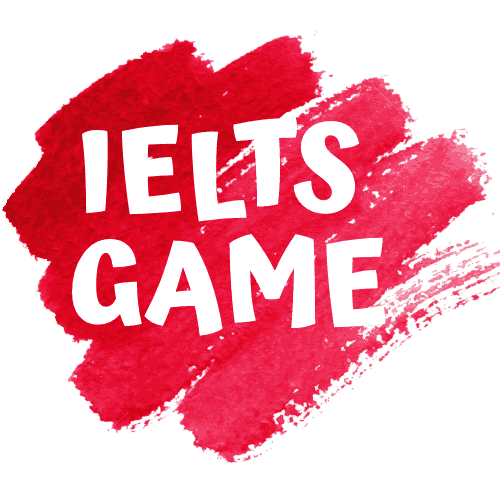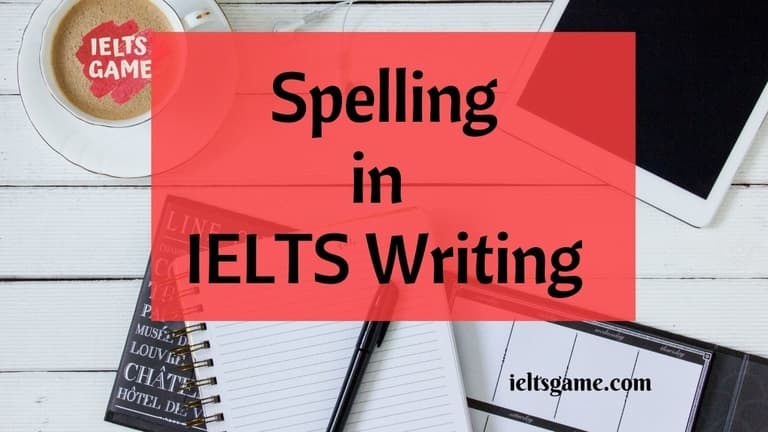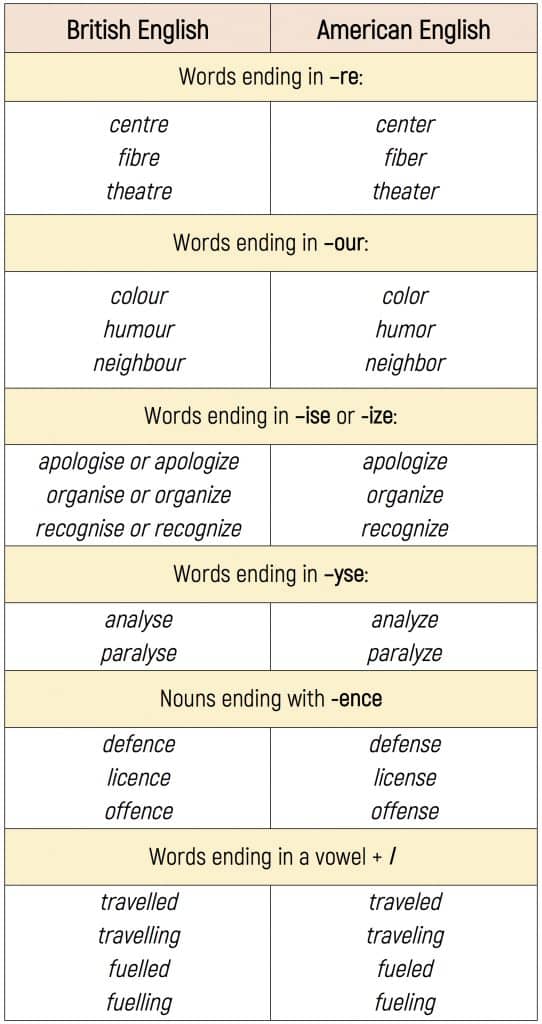Spelling in IELTS exam: Rules | mistakes | British vs American
How do you spell these words: achieve or acheive? travelling or traveling? recomend or recommend?
Please write your answers in the comments box at the end of the article.
So, in this article, IELTS Game will speak about spelling and its importance for the IELTS test, rules, mistakes, and the differences between British and American accents in this topic.
Table of Contents
Why spelling is important in English language?
There is no doubt that knowledge of spelling rules is crucial for the IELTS Writing section, as 25% of your score depends on it (correct spelling is a part of the assessment criteria “Lexical Resource”).
For example, to get a Band 8, the candidate needs to “produce rare errors in spelling and/or word formation”.
But for a Band 6, the candidate may “make some errors in spelling and/or word formation, but they do not impede communication”.
Besides the Writing part, spelling is highly important for the Listening and Reading sections.
There are no special assessment criteria in these parts of the test.
But you must keep in mind that if you misspell the answer in your Listening or Reading answer sheets, it will be considered as wrong, and you will lose points.
Common spelling mistakes in IELTS Writing
Some spelling rules are always broken by IELTS examinees. I decided to make a list of the most common mistakes that candidates make during the IELTS test.
I hope you will pay more attention to your spelling and will try to avoid the following errors.
1. Double consonants
Very often candidates mix up single and double consonants that occur nearby in a word. For example:
Correct – Wrong
across – accros
process – procces
parallel – paralell
professor – proffesor
Some words have two pairs of double consonants. Don’t forget to write all the consonants!
- success
- possess
- access
- embarrass
- accommodation
- assess
- address
2. Unstressed vowels
These mistakes mostly occur in the Listening part.
When you hear a word with an unstressed syllable, sometimes it can be difficult to say what vowel should be written in the syllable as in most cases it is pronounced like [ə] (the schwa). For example:
- capable [‘keipəbl]
- temperature [‘tempritʃə]
- relevant [‘relivənt]
- category [‘kætigəri]
- performance [pə’fɔ:məns]
- achieve [ə’tʃi:v]
- etc.
3. Different form
When a noun becomes an adjective, or a verb becomes a noun, some suffixes can be added or some consonants may change.
It leads to a number of different mistakes too. You must remember the rules of changing forms:
- benefit > beneficial;
- influence > influential;
- maintain > maintenance
- pronounce > pronunciation
- occur > occurred
- begin > beginning
- success > succeed
- process > proceed
- etc.
4. Silent letters
In some English words, there are letters that are not pronounced, but you mustn’t miss them in writing:
- column, autumn – n is not pronounced
- science, discipline, descend – sc are pronounced as one sound
- excite, excellent, exception – c is not pronounced
Spelling rules
Now, you know what mistakes IELTS candidates usually make.
Also, it’s important to know some basic spelling rules if you want to get a high IELTS score.
1. Double ‘L’ in adverbs
As a rule, we add the ending “-ly” to an adjective in order to form an adverb: constant > constantly.
And here you should remember that if an adjective ends with “l”, there will be double “l” in an adverb:
- beautiful > beautifully
- normal > normally
2. Endings: “-ing” and “-ed”
We use the endings “-ing” and “-ed” to make special verb forms: “ing” is used to form a present participle and a gerund, and “ed” forms a past form and a past participle of regular verbs.
Most often, there are no changes in a verb when we add these endings:
- visit > visiting > visited.
But if a verb ends with “-e”, we should omit this ending when adding “-ing” and “-ed”:
- live > living > lived
- joke > joking > joked
If it is a one-syllable verb, it has a short vowel in the middle and it ends with a consonant, this last consonant is doubled:
- stop > stopping > stopped
If a verb ends with -ie, this combination of vowels is replaced by -y when we add -ing:
- lie > lying
- die > dying
British or American spelling?
As you probably already know, British and American variants of English language have some different features, and spelling is one of them.
You are allowed to use both variants in IELTS, and it concerns all aspects: pronunciation, grammar, vocabulary and spelling.
But it’s not advisable to mix these two variants. In other words, if you start writing your essay using British spelling, stick to it throughout the whole answer.
Here is the list of spelling differences in British and American English:
How can I improve my spelling?
The most effective way to improve your spelling is to learn words by heart.
When you learn a new word, always try to remember how it is spelled.
If you often do mistakes in words that you already know, write these word down several times until you learn the correct spelling.
Every time you practice in writing an essay at home, check your answer and mark every word you misspelled.
Then you should find the right spelling in the dictionary and memorize it.
It is very useful for your spelling to practice writing essays on a sheet of paper.
When you practice writing on your computer, the system always checks your work for grammar and spelling mistakes and very often corrects them itself.
So you won’t even know that you misspelled the word.
Some people say that reading also helps to improve spelling, but I think it takes a lot of time.
Reading, in general, is very good for your command of English, and if you have a lot of time for preparation, you can use this method.
But if your exam is within a month or two, keep to the learning-by-heart method
Good luck!



One Comment on “Spelling in IELTS exam: Rules | mistakes | British vs American”
Many thanks! All the posts are so helpful indeed and mostly that one.